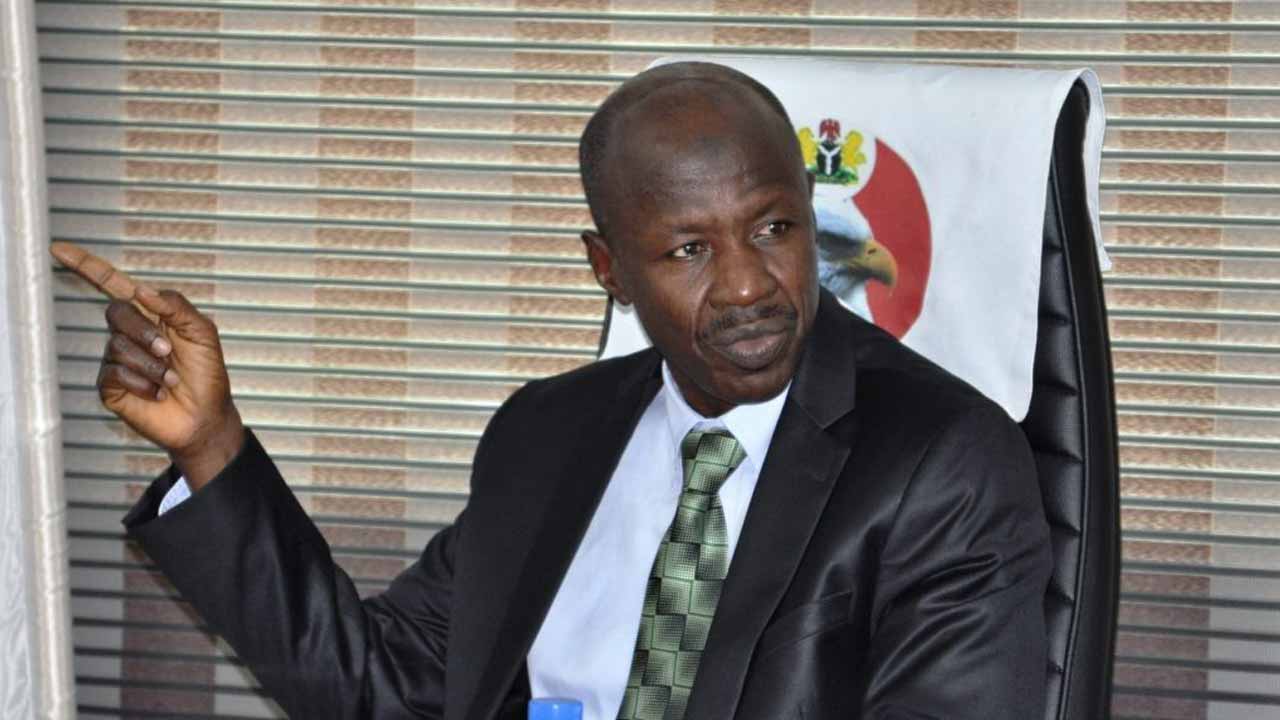- Anti-graft War Now Total, Says Magu
Economic and Financial Crimes Commission (EFCC) Acting Chairman Ibrahim Magu yesterday said the war against corruption “is now total”.
The commission, he said, is more determined than ever to fight corruption to a standstill and to sustain “the current momentum”.
“We’re now going to declare total war on corruption. It is our responsibility to crush corrupt practices in this country,” he said.
Magu spoke in Lagos. He was received by a team of senior editors and management.
The EFCC chief was accompanied by the commission’s Public Affairs Director Mr Osita Nwaja, Head of Media Mr Wilson Uwujaren and Head, Media in Lagos Office, Mr Samin Amaddin.
He described the biggest challenge to the Muhammadu Buhari administration’s anti-graft crusade as “corruption fighting back”.
“It’s real and they (those fighting back) have all the money,” he said.
Magu said there were no fewer than 125 high profile corruption cases still “hanging in court”.
On the delay of such cases, Magu blamed it all on Senior Advocates of Nigeria (SANs), who he said were used by rich and powerful suspects to frustrate cases.
“How can 31 SANs go to court to defend one (suspected) looter? Sometimes judges are intimidated. Why should 31 SANs appear for a suspect? We need to ask questions,” Magu said.
He said such lawyers adopt several strategies to delay cases, some of which have spent nearly 10 years in court.
“They abuse the court process, file all kinds of applications and go on appeal, which goes up to the Supreme Court and back. They adopt different technicalities and delay tactics. Sometimes they provoke the judges and write petitions against them.
“But I don’t control the judges. We don’t have control over what happens in court. Our role is to investigate,” he said.
Magu denied allegations that EFCC does shoddy investigations and prosecute ineffectively.
“We investigate better than any other law enforcement agency in this country, including the police,” he said.
Magu said he does not interfere with the work of investigators, adding that once any intelligence is received, the investigation must be concluded.
The Acting EFCC chairman denied any rift with the Attorney-General of the Federation (AGF) and the Department of State Services (DSS).
“I am a law-abiding citizen. I respect constituted authority,” Magu said, adding that he duly handed over the list of high profile cases as requested by AGF Abubakar Malami (SAN).
On loot recovery, Magu said one of EFCC’s strategies was to recover assets and funds suspected to be proceeds of crime by applying to the court for interim forfeiture orders, publishing a 14-day notice for the owners to show up, and then applying for a final forfeiture.
He said the EFCC had appealed the acquittal of former Adamawa State Governor Bala Ngilari, who was discharged by an Appeal Court sitting in Yola of corruption charges.
Magu denied that former Bayelsa State Governor Timipre Sylva, who is under EFCC investigation, had retrieved properties seized from him by the commission.
“We have not released any property to Sylva,” Magu said.
On his non-confirmation by the Senate, Magu said: “I strongly believe in God. When it’s time to leave I’ll leave.”
On the threat by the Egmont Group of Financial Intelligence Units to expel the Nigerian Financial Intelligence Unit (NFIU) for not being an independent entity, Magu claimed there were moves to meet the group’s demands long before the Senate intervened.
He said before the Senate’s move to completely remove NFIU from the EFCC, there were moves to make NFIU a separate unit within the anti-graft agency and to secure the tenure of its director so it is not tied to that of the EFCC chairman.
According to him, granting NFIU “some security and operational autonomy” was what the Egmont Group demanded.
He believes the Senate’s move to pass a law to make the NFIU independent of the commission was a bid to “weaken the workings of the EFCC”.
Egmont Group was created to provide Financial Intelligence Units around the world a forum to exchange information confidentially to combat money-laundering, the financing of terrorism and other predicate offences.
Magu said the shooting at the EFCC had been referred to the police.
“There is a real threat, but we are used to it,” he said, adding that the department that was attacked had been transferred to a safe location.
He said the war against corruption could not be successfully fought without media support.
“I believe all journalists are corruption fighters. Let everybody do the right thing. Let us mobilise everybody’s support in the fight against corruption. Consider yourself as if working for the EFCC.
“Corruption is the worst developmental problem we have in this country. We need more support. This fight is for our collective good.
“We should not allow ourselves to be purchased to the detriment of our co-existence. We need to mobilise everybody. Let’s do it together.
“We need your collective support in whatever we’re doing. You have supported us and we ask for more support. We owe a duty to this country. We must do the right thing for our collective good.
“We’re not going to completely kill corruption, but we have a collective responsibility to reduce it,” Magu said.


 Forex3 weeks ago
Forex3 weeks ago


 Naira2 weeks ago
Naira2 weeks ago
 Billionaire Watch2 weeks ago
Billionaire Watch2 weeks ago




 Naira2 weeks ago
Naira2 weeks ago




 Naira2 weeks ago
Naira2 weeks ago




 Naira4 weeks ago
Naira4 weeks ago


 Naira7 days ago
Naira7 days ago
 Banking Sector4 weeks ago
Banking Sector4 weeks ago





















